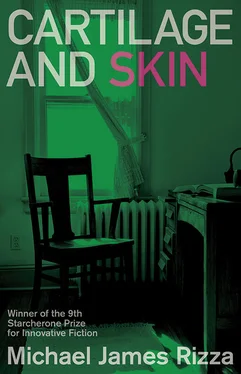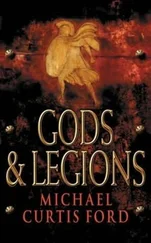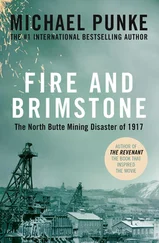Standing before the door, I looked down the hallway to make sure no one was watching, and then I leaned my head closer to the door, still curious if McTeal was a family man or if he at least had a roommate. Yet, before my ear reached the surface, the brim of my hat knocked against it, causing my hat to tumble to the floor behind me. I instantly looked around again, but nobody was there. Moving slowly, more like a thief than a trespasser, I pressed my ear to the door. Everything was silent.
An impulse seized me, but before I acted on it, I put the hat back on my head, walked to the top of the stairs, and looked down to make sure that I was alone.
Back in front of McTeal’s apartment, I took hold of the doorknob, and to my horror, it turned. As the door inched inward, I peeped around the edge and saw the lighted interior of the man’s home. Before I fully registered the spartan décor of the place, I looked around for any signs of life. The main living area was apparently vacant, and although someone could have been in another room, I had a sense that McTeal lived alone. The walls contained no pictures or bookshelves. The few pieces of furniture were mismatched, undoubtedly acquired at various times, at different locations, from department stores and garage sales to the attics of relatives and the basements of friends. Even though there was wall-to-wall beige carpeting, between the couch and the television was an area rug with a maroon and black floral design. Here was another clue that he was a lonely bachelor, for I imagined that the sensibility necessary to place that rug on the carpet seemed to obliterate the likelihood of a woman’s touch. The room felt colder than the hallway because a sliding glass door on the far wall was slightly open. If the man were in any way vile or obscene, nobody would have been able to discern it from the room.
Interestingly, I didn’t see a computer station, which meant that one of the darkened rooms to the right was where he squandered his time and called up the lurid images of Claudia Jones, where he pined and lusted, where he slobbered, ached, and groaned. Perhaps, if guests ever visited him, he closed the door to that particular room, and as they sat on his couch, placed their drinks on his coffee table, and made their usual polite talk, they had no idea that they were sitting in the middle of a façade. In the main living area, everything looked nondescript and normal, if not almost barren.
McTeal was doing his laundry, and by the size of the sack, he probably had about two loads.
Glancing back into the empty hallway, I stepped into the apartment and closed the door.
My heart began to race like mad, but I was only going to take a quick look around and then run off, perhaps leave a note magnetted to his refrigerator, something to indicate that I had won our little battle, something unsigned and unsettling:
Dear Fruitcake: I have peed in select corners of your home .
On his coffee table were several blank postcards, all featuring the Grand Canyon, as well as a glass ashtray with one snuffed cigarette butt. Once I saw the ashtray, I became aware of the odor of smoke. And when I saw a cat box that contained dark clumps of litter and a tiny, disgusting plastic shovel, such as might belong in a sandbox or on the beach, I detected an acrid fecal smell too. The sliding door must have been open to let in some fresh air or perhaps to allow the cat free passage in and out.
The long blinds were pulled to the right, and leaning against the glass was a hollow metal rod, as if McTeal had taken a hacksaw and cut a mop handle. Holding the battered rod in my hand, I looked out through door and saw the falling snow gathering on the railing of a small balcony. A single lawn chair was covered with snow, and beside it was a five-gallon bucket, which might at one time have contained plaster or paint, but now probably functioned as a table. Beyond the balcony, a small courtyard was surrounded on three sides by the backs of buildings, and by a low brick wall on the other. Some of the balconies and windows were decorated with Christmas lights. In the courtyard, the snow-topped trees, shrubbery, and a pair of benches were visible in the arcs of light cast by lamps that lined the blanketed walkways. McTeal apparently had a healthier and more peaceful view from his balcony than I had into the gritty alley outside my window.
Still holding the piece of handle, I walked toward the dining area. Newspapers were spread over a tabletop. McTeal must have recently built, repaired, or dismantled something because several hand tools remained on the table. The hammer had a smooth wooden handle, with two nails driven into the top of it and bent over to keep the head from coming off. I looked around to see what McTeal was working on, when I noticed the cat watching me from beneath the couch. I put the hammer down, picked up a pair of needle-nose pliers, and then returned that too. The cat, with only its fluffy orange head sticking out, continued to study me. Its eyes were two pieces of black glass set into a puff of fur. I didn’t know if I had spooked the animal to hide beneath the couch or if that was its normal refuge.
Less than a minute, I told myself. I kept time in my head.
As I started toward the two darkened doorways, I imagined that another living and cowering creature might also be present in the room, alert and tense and suspicious. Once again, I was seized by the sudden awareness that I had no idea what I was doing, and this knowledge seemed to come from outside of myself, as if I were watching a lanky man in a muddy green coat and a silly hat as he stepped cautiously across a span of carpet in a strange room, wielding a section of mop handle like a weapon, approaching the private rooms of a man he didn’t know. And before I began to comprehend my motive, let alone judge what kind of person I was, I found myself standing beside one of the doorways, first peeking around the edge of the doorframe, and then reaching my hand inside and sliding it up the cool wall. And before I even knew that I felt the light switch, an abrupt glare exposed the room; the tiled walls and floor glinted, white and blue. And even though I was looking at a completely vacant bathroom with nobody in the tub and nobody on the toilet, I hadn’t fully reckoned with the possibility of finding a person, not just with what I would do but also with how the person would react to me suddenly flipping on the light — and this was probably because I never really believed in the first place that anyone was in the apartment. No one could have been there, not because reason or evidence demanded that this was the case, but rather because I implicitly understood that McTeal was alone in the world, with no friends or relatives to give him furniture or to talk politely in his living room over a cup of coffee: He was too inept or twisted to have made any sustainable human connection. Still, I raised the cut handle as I approached the second doorway, which I already knew — before I even reached my hand into the gloom and turned on the light — was going to be an empty bedroom. The bed sat square and tight without a single crease in the covers, without a headboard, as though it belonged in a barracks or a hospital. The nightstands on either side of it were polished, clear, and seemingly unused. Just as in McTeal’s photographs, in his “love letters,” the wall above the bed was barren. In fact, all the walls were barren. I expected to find a tripod set up and directed toward the familiar scene; however, what I discovered was a coffee can on the edge of a dresser directly across from the foot of the bed. The only thing on the dresser was the can, upside down, as though the plastic lid served as a coaster protecting the wooden surface from scratches. Atop the can was perched a tiny gold-colored camera.
Читать дальше












